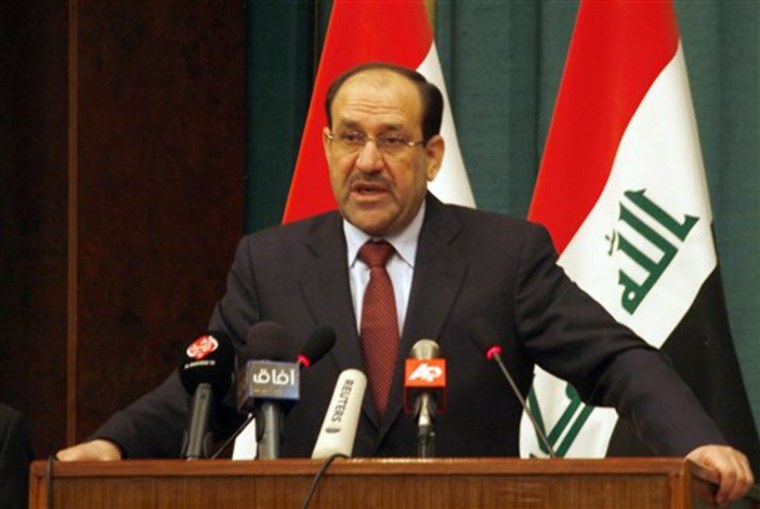Iraqi lawmakers moved to break the deadlock over the choice of a new speaker Sunday by agreeing to form a committee to choose a candidate after Sunnis failed to reach consensus on a nominee, the deputy speaker said.
The Sunni speaker Mahmoud al-Mashhadani resigned on Dec. 23 amid widespread complaints about his erratic behavior, leaving the key post vacant for nearly a month.
The bid to resolve the dispute comes just two weeks before key provincial elections aimed in large part at empowering minority Sunnis, who spearheaded the insurgency that erupted after the collapse of Saddam Hussein's regime in the 2003 U.S.-led invasion.
In its first report of problems with the elections process, the commission overseeing the vote said about 30 of the more than 14,000 candidates have been disqualified for violating rules ranging from submitting forged documents to being members of the former ruling Baath Party or the Iraqi security forces.
The commission also said it was investigating allegations that nearly 60 candidates have lied about their level of education due to a requirement that they have at least a high school degree.
New speaker must be a Sunni
Al-Mashhadani's replacement must be a Sunni Arab under a system that distributes key positions to the different religious and ethnic communities. But the main Sunni bloc, the Iraqi Accordance Front, has failed to agree on a candidate.
The disagreement threatens to block the 275-seat parliament from making key decisions on legislation. The Shiite deputy speaker can preside over sessions, but the Sunnis object to participating until a speaker from their bloc is elected.
Lawmakers convened on Jan. 11 for the first time this year with deputy speaker Khalid al-Attiyah at the helm. But they have delayed a vote on a new speaker to allow the Sunnis time to reach agreement amid bitter infighting over a choice.
Al-Attiyah met with the political blocs in parliament Sunday and decided to form a committee to name a candidate and set a date for a vote.
The dispute centers on the choice of the largest group in the Accordance Front, the Iraqi Islamic Party, which has pushed for Ayad al-Sammaraie, a prominent lawmaker who lived for years in exile in Britain during Saddam's rule.
Smaller factions have advocated other candidates and accused the Islamic Party of trying to dominate the bloc and of conspiring with the Shiites and Kurds to oust al-Mashhadani to bolster its position in the government at the expense of other Sunnis.
The head of one of the smaller groups, the National Dialogue Council, offered three proposals on Sunday, including naming himself as a candidate along with al-Sammaraie, choosing the moderate Sunni Vice President Tariq al-Hashemi as speaker or allowing al-Mashhadani to put his name in to be re-elected. All of Khalaf al-Ilyan's suggestions were rejected.
Fears of new violence
U.S. commanders have warned the uncertainty over Iraq's political stability could lead to new violence at a time when the more than 140,000 U.S. troops are facing cutbacks under the incoming Obama administration.
U.S. and Iraqi officials are hoping the Jan. 31 provincial elections will help unify the country's fractured sectarian and ethnic groups.
More than 20 million ballots already have been printed outside the country and were to be flown into Iraq this week.
The head of Iraq's independent electoral commission Faraj al-Haidari said the names of the disqualified candidates would be posted on a list at polling stations.
He added that disqualified candidates will not be allowed to take the seats even if they receive enough votes.
Voters are set to choose members of ruling councils in 14 of the 18 provinces. More than 14,000 candidates are running for 444 council seats.
The U.N. has expressed confidence that any attempts at fraud or tampering with ballots will be detected as the election will be under tight scrutiny.
